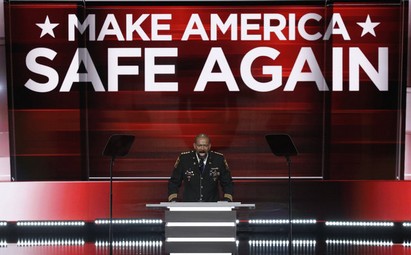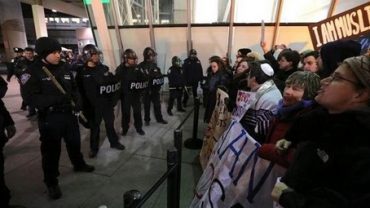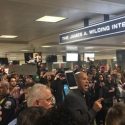2 Sides to the Immigration Brouhaha #MASA
No one gets anywhere by trying to roll Donald Trump’s immigration order and its varied implications into a spitball for hurling hard and fast at the Other Side.
That is not to split the difference, in namby-pamby fashion, between supporters of the present immigration freeze and those Americans who, like Nancy Pelosi, claim to see tears trickling down the Statue of Liberty’s cheek. The present matter, may it please the court, is too grave for sweeping claims of the sort the Twitter age has raised almost to Shakespearean dignity.
It’s a tough deal, everybody should acknowledge: tough protecting the public safety, tough judging when and how to inhibit the activities of those who might (not will, necessarily, but might) endanger the public safety. A balancing act of vast delicacy is needed to get the job done.
But you have to know how to balance — a skill seldom on display in Donald Trump’s toolbox. He might have forestalled the international din over his executive order by thinking through — you’d expect this of a business tycoon — the execution and marketing side of things. He didn’t, apparently. Down came the order. There was uncertainty over what to do with bearers of green cards. His own secretary of homeland security was, by report, less than fully briefed. There was no rapid response team on the political side. What are they paying you for anyway, Kellyanne Conway? And you, Stephen Bannon?
It all had the look of Amateur Night at the White House. Critics of the order had uninterrupted leisure to paint the implications in direful, not to say emotional, terms. Truly sad stories came to light: bearers of green cards detained or diverted at airports; good and potentially valuable newcomers despairing over plans that dwindle suddenly into just ordinary hopes.

Nor does Trump himself seem to have wasted much thought on the political dust storm he was about to kick up. What about the Supreme Court nominee (name unknown at this writing) he would announce this week? Had not our maximum leader considered that hearings on the nomination may now degenerate into partisan back-and-forthing about immigrant rights instead of the more vital question of how we make our justices quit making law? Oregon Democratic Sen. Jeff Merkley says he’ll filibuster anybody Trump puts up. Nothing like an open mind, I always say.
So what about the other side of things — the executive order that made Lady Liberty weep? Several things require pointing out.
Salus populi suprema lex, goes the old Latin tag; the people’s welfare — likewise translated as safety — is the supreme law. Will Trump’s immigration order render Americans safer in their beds and workplaces? I cannot make that claim. I can say only that the priority of that goal over even the wholesome expectations of non-Americans is the dispositive point. We must judge it one of several points that Trump voters wished in November to reinforce.
Nor does there exist any abstract human right to move to another country, without permission from the residents and their government. That we are “a nation of immigrants” is indisputable, as is, or should be, the point that immigration is the sincerest form of flattery. The kind of people attracted by the kind of country we live in are the kind of people, generally speaking, we want to live around. But we the people — like the people of Iran or Syria or Iraq or Sudan — retain the right to judge, to answer the knock on the door, or, if circumstances warrant, to scram.
No issue today is more complex than that of whom we want to live with and around us. I know of no formulas for resolving the matter in a world linked by airplanes and smartphones. A lot of our guesses, including, possibly, Donald Trump’s, will be wrong, even harmful. We have to let certain events and circumstances play out, it seems to me, before issuing stark, declarative judgments. The Trump policy on immigration is hardly long-term: a 90-day delay for nationals from seven Muslim-majority nations and a four-month suspension of the refugee program. One could wish he hadn’t done it exactly the way he did. But he did it. It may turn out — like so many political projects — to fall somewhere, unpredictably, between catastrophe and the worldly paradise.






